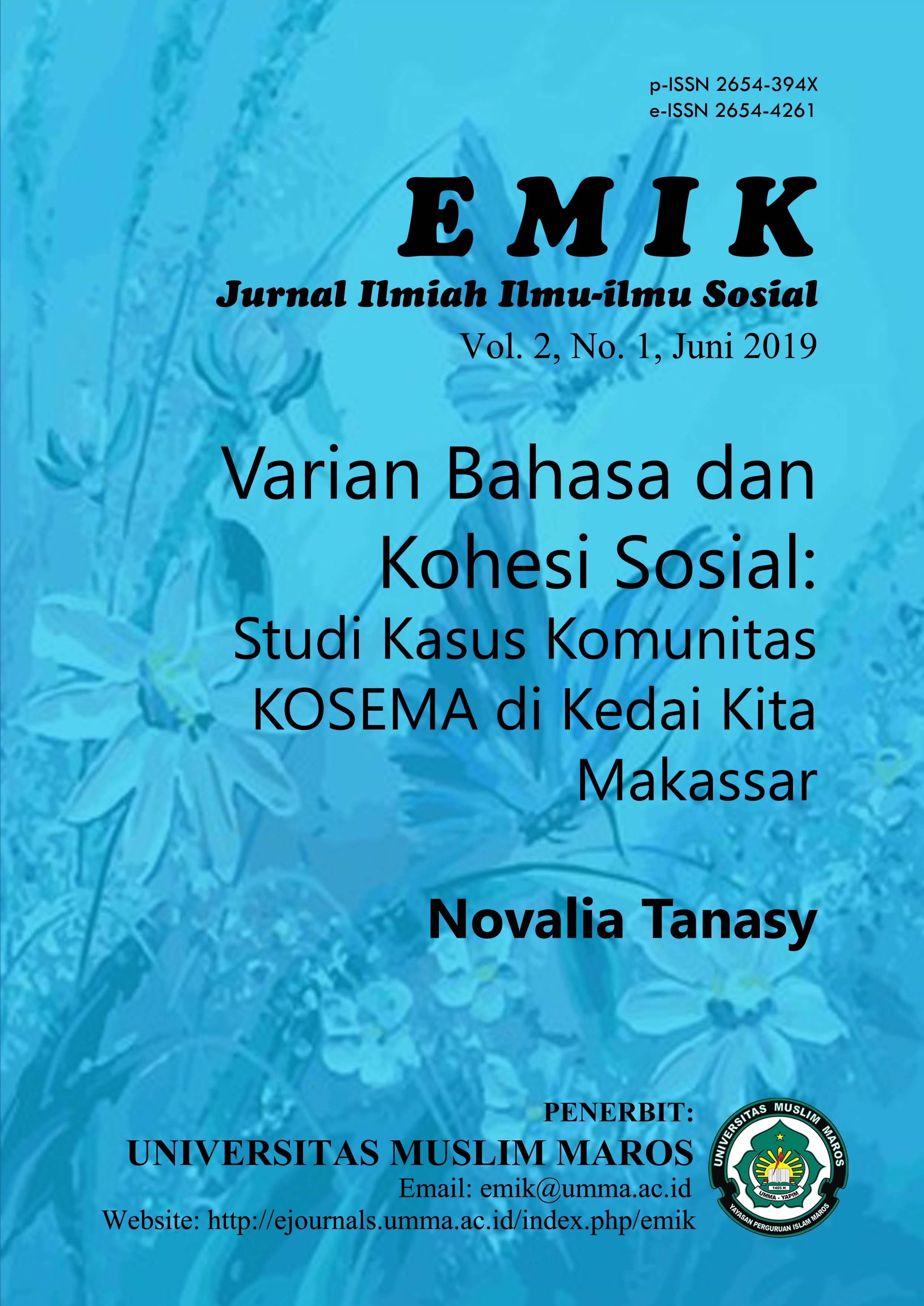Varian Bahasa dan Kohesi Sosial
Studi Kasus Komunitas KOSEMA di Kedai Kita Makassar
Keywords:
KOSEMA, Social Cohesion, Language Variants, Sociolect Acrolect, Sociolec VulgarAbstract
In the current era of globalization, there are often different tendencies arise. This seems to be incompatible with the use of good and correct Indonesian language rules. In addition, strange words are usually included in between, but they are still understandable. While many studies tend to deal with language variant on its linguistics components, this study is focused on sociolect and how it affects social relationship.
The study was conducted between 2015 and 2016 at Kedai Kita Makassar. Data was collected using survey of 63 members of KOSEMA, followed by interview of 13 respondents through face to face interview, mobile phone interview, and social media (Blackberry Messenger, Facebook and Whatsapp) as well as observing their interaction and content of their conversation in the social media group owned by KOSEMA.
The study indicates that the two most dominant language variants used and influencing the social cohesion are sociolect acrolect and sociolect vulgar, proven by the high percentage of acquisition results in each indicator of social cohesion, 98,38% (for acrolect) and 83,87% (for vulgar). Although sociolect acroletc and sociolect vulgar are mutually contradictory, they play a significant role in enhancing social cohesion among KOSEMA members as long as it is used in the right situation and with the right person. The use of sociolect acrolect is generally favored by all members of KOSEMA because it is considered polite and respectful for speakers and listeners, especially by female members. Even so, the presence of sociolect vulgar is always looked forward as an atmosphere warmer, especially among male members.
References
Airlangga, D. 2014. “Sosialisasi tentang Pengetahuan Keagamaan oleh Orang Tua Beda Agama kepada Anaknya (Studi Deskriptif di Surabaya)”, Jurnal Sosial dan Politik. 3(1):1-23, https://studylibid.com/doc/492009/untitled---journal---unair, diakses tanggal 10 Februari 2015.
Bell, R. T. 1984. Sociolinguistics: Goals, Approach and Problems. London: Batsford.
Chaer, A dan Leonie A. 2004. Sosiologi: Perkenalan Awal. Jakarta: PT Rineka Cipta.
Deutschman, M. 2003. Apologising in British English. Umea Universitet.
Florida, R. 2012. The Rise of the Creative Class. Revised. New York: Basic Books.
Karidakis, M. 2015. “Shift in the use of migrant community languages in Australia”, Journal of Multilingual and Multicultural Development, 1(1):1-22, https://www.researchgate.net/publication/275097008_Journal_of_Multilingual_and_Multicultural_Development_Shift_in_the_use_of_migrant_community_languages_in_Australia, diakses tanggal 19 April 2015.
Meyer, L. 2012. “Fishman’s Cultural Autonomy as an approach to sociolinguistic power-sharing”, International Journal of the Sociology of Language, 12(4):206-213, https://www.researchgate.net/publication/270552326_Fishman's_Cultural_Autonomy_as_an_approach_to_sociolinguistic_power-sharing, diakses tanggal 10 Februari 2015.
Rahardjo, M. 2014. Andai Ahok Belajar Sosiolinguistik, http://mudjiarahardjo.uin-malang.ac.id/kebahasaan/401-andai-ahok-belajar-sosiolinguistik.html, diakses tanggal 10 Februari 2015.
Ritzer, G. 2014. Teori Sosiologi dari Klasik sampai Perkembangan Terakhir Postmodern (Edisi ke 8). Yogyakarta: Pustaka Pelajar.
Severo, C. 2014. “Fishman’s legacy: On the relation between the sociology of language and sociolinguistics:”, De Gruyter Mouton, 24(3):119-132, https://www.academia.edu/36222937/_Fishman_s_legacy_On_the_relation_between_the_sociology_of_language_and_sociolinguistics, diakses tanggal 18 Februari 2015.
Sudaryanto. 1982. Metode Linguistik: Kedudukannya, Aneka Jenisnya dan Faktor Penentu Wujudnya. Yogyakarta: Fakultas Sastra dan Kebudayaan.
Sulastriana, Elva. 2015. “Pengaruh Sikap Bahasa terhadap Kesantunan Berbahasa Mahasiswa IKIP PGRI Pontianak”, Jurnal Pendidikan Bahasa, (4)1:71-82.
Tribun Timur. 2014. Ini Alasan Hotman Paris dan Ruhut Sitompul Tak Pernah Akur, https://www.kaskus.co.id/thread/5a7d3fff14088d63438b4567/ini-alasan-hotman-paris-dan-ruhut-sitompul-tak-pernah-akur, diakses tanggal 14 Februari 2015.
Wardaugh, R. 2010. An Introduction to Sociology of Language. Victoria: Blackwell Publishing.
Waskul, D. 2008. Symbolic Interactionism: The Play and Fate of Meanings in Everyday Life,https://www.academia.edu/17657852/Symbolic_Interactionism_The_Play_and_Fate_of_Meanings_in_Everyday_Life, diakses tanggal 15 Februari 2015.









9.png)















